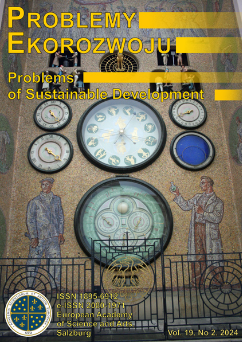Joseph Kozielecki’s Concept of Transgressive Man and the Problems of Sustainable Development
Marek Tański
Katedra Psychologii Zdrowia, Uniwersytet Pedagogiczny im. KEN w Krakowie, ul. Ingardena 4, 30-060 Kraków (Poland)
Abstract
In this article the author notes, that the development according to Joseph Kozielecki depends on the fact, that man transcends natural, symbolic, social borders, associated with his own inner world, in order to satisfy own needs. He aims to improve the quality of life, and also tries to preserve the natural environment in possibly best condition. This understanding of the concept of development approaches psychologist‘s attitude to the idea of sustainable development, which rests on three pillars: environmental, economic and social. One of the most important categories for understanding development and sustainability issues is the value of life, which is endangered by destructive transgressions as destructive actions contributing to the destruction of natural phenomena, and also causing psychopatic changes in the human personality. Sofronic transgressions are designed, inter alia, to control actions (prudence, moderation, inner discipline, the ability to find a compromise). To be equal to the value of life a transgressive man must be aware of his own dignity.
Keywords:
value of dignity, transgression, hubristic need, know thyself, sustainable developmentReferences
BARTOSZEWSKI J., 2012, Człowiek XXI wieku. Recepcja kartezjańskiej filozofii przyrody, WSHE Sieradz, Kraków.
Google Scholar
DEMBIŃSKA-SIURY D., 1991, Człowiek odkrywa człowieka. O początkach greckiej refleksji moralnej, Wiedza Powszechna, Warszawa.
Google Scholar
GAWOR L., 2006, Idea zrównoważonego rozwoju jako projekt nowej ogólnoludzkiej cywilizacji, in: Diametros vol. 9, p. 84-104.
Google Scholar
GAŁDOWA A., 2000, Powszechność i wyjątek, Rozwój osobowości człowieka dorosłego, UJ, Kraków.
Google Scholar
HULL Z., 2003, Filozofia zrównoważonego rozwoju, in: Filozoficzne i społeczne uwarunkowania zrównoważonego rozwoju, ed. Pawłowski A., Politechnika Lubelska, Lublin p. 15-27.
Google Scholar
KOZIELECKI J., 1987, Koncepcja transgresyjna człowieka. Analiza psychologiczna, PWN, Warszawa.
Google Scholar
KOZIELECKI J., 1995, Koniec wieku nieodpowiedzialności, Jacek Santorski & CO, Warszawa.
Google Scholar
KOZIELECKI J., 2008, Psycholog w wielkim świecie. Szkice o sprawach ludzkich, Żak, Warszawa.
Google Scholar
KOZIELECKI J., 1977, O godności człowieka, Czytelnik, Warszawa.
Google Scholar
KOZIELCKI J., 2001, Psychotransgresjonizm, Wydawnictwo Akademickie „Żak”, Warszawa.
Google Scholar
KOZIELECKI J., 2004, Społeczeństwo transgresyjne. Szansa i ryzyko, Wydawnictwo Akademickie „Żak”, Warszawa.
Google Scholar
LIPIEC J., 2001, Świat wartości. Wprowadzenie do aksjologii, Fall, Kraków.
Google Scholar
MAY R., 1978, Miłość i wola, PIW, Warszawa.
Google Scholar
PAPUZIŃSKI A., 2006, Filozoficzne aspekty zrównoważonego rozwoju, in: Problemy Ekorozwoju/Problems of Sustinable Development, vol. 1, no 2, p. 25-32.
Google Scholar
PAPUZIŃSKI A., 2013, The Axiology of Sustainable Development: An Attempt at Typologization, in: Problemy Ekorozwoju/Problems of Sustinable Development, vol. 8, no 1, p. 5-25.
Google Scholar
SKOWROŃSKI A., 2003, Wartości ekologiczne dla zrównoważonego rozwoju, in: Filozoficzne i społeczne uwarunkowania zrównoważonego rozwoju, ed. Pawłowski A., Politechnika Lubelska, Lublin, p. 27-41.
Google Scholar
TAŃSKI M., 2008, O racjonalności i irracjonalności myślenia transgresyjnego, in: Zagadnienia Naukoznawstwa, 2008, vol. 3-4, p. 451-458.
Google Scholar
WĘGRZECKI A., 2007, Poznanie siebie a rozwój podmiotu osobowego in: Egzystencjalne i aksjologiczne wymiary prawdy, piękna, dobra, eds. Gazda J., Moszczyński W., Księgarnia Akademicka, Kraków, p. 11-19.
Google Scholar
Authors
Marek TańskiKatedra Psychologii Zdrowia, Uniwersytet Pedagogiczny im. KEN w Krakowie, ul. Ingardena 4, 30-060 Kraków Poland
Statistics
Abstract views: 25PDF downloads: 8
License

This work is licensed under a Creative Commons Attribution-ShareAlike 4.0 International License.




